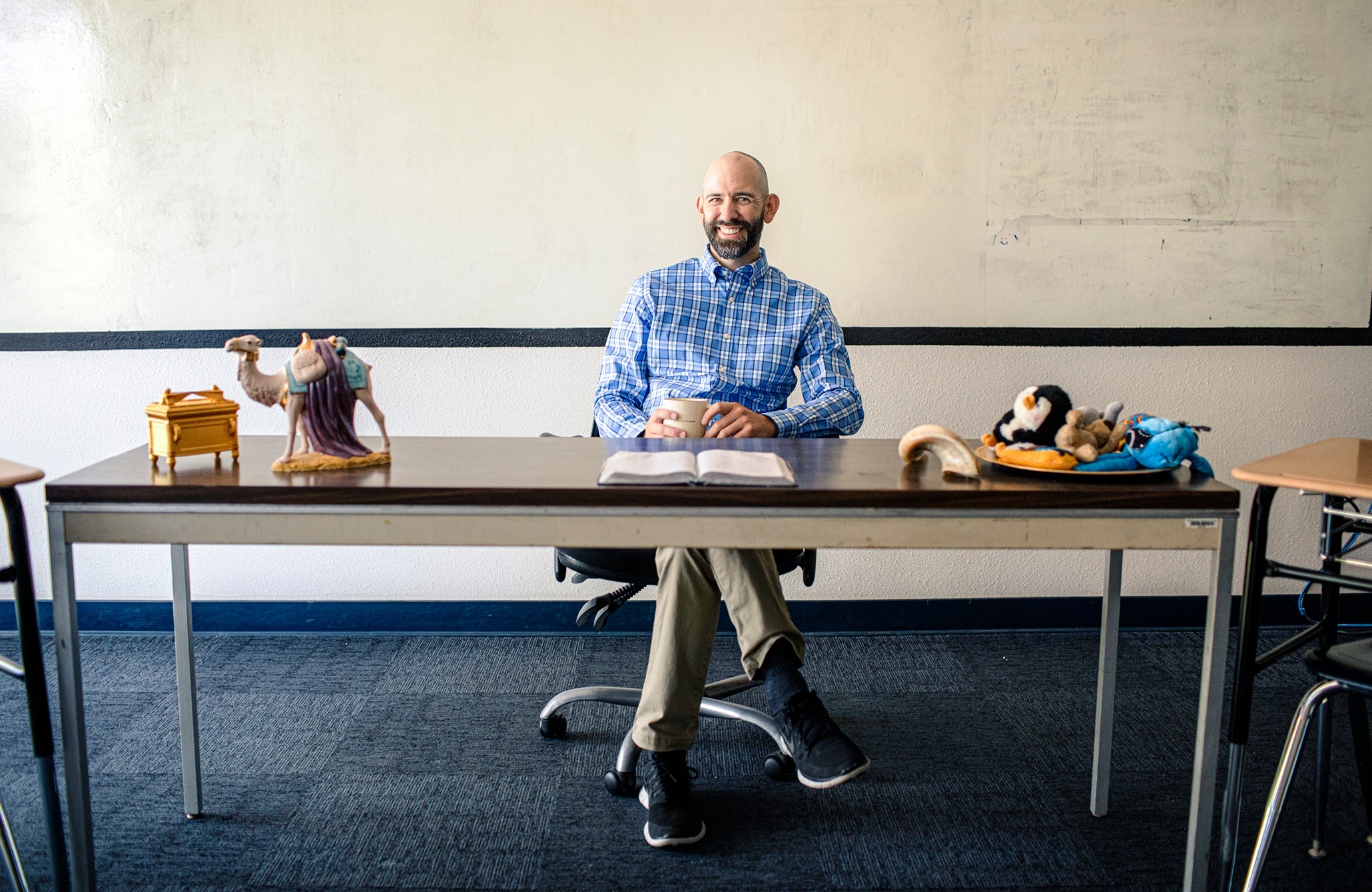
Lend Me Your Eyes
“Lend me your eyes.” A group of high school students turn their heads, some excited, some begrudging, to make eye contact with their teacher. “You are beloved children of the King on high, you have infinite value and worth, and you’re called to be a part of God’s story.”
37221
This is how James Layton (DMin ’18, MDiv ’06) begins every class with his students at Maranatha High School in Pasadena, where he teaches theology and biblical studies. “I always felt a need to greet the class. I used to say, ‘I’m really glad you’re alive, and breathing, and well.’ It just kind of came out one day,” James recalls. “But then one year, the valedictorian gave a speech in front of the school and she quoted that: ‘I’m glad you’re alive, and breathing, and well.’ Part of me was flattered. But it gave me a reverent fear because I realized that anything I repeat over and over they’re going to remember.” The valedictorian’s speech helped James to realize the power of repetition that exists in liturgies—rather than what is new being most important, he found that the ordinary and daily routines of the classroom were the most significant for his students’ formation.
Deciding to carefully design these recurring moments, he started with the beginning and formed the statement “You are beloved children of the King on high,” which he feels sums up his theology. Every day and in every class period, James and his students engage in a rhythm, in a liturgy together. “The classroom is a place where transformation can happen,” he says. “Every time you look in someone’s eyes you have an opportunity to love them and see them.” In his classroom, he arranges the desks in a circle so he is able to see the eyes of every student. Once the bell rings, the students and James see one another and begin by remembering who they are.
What’s Your Weather Forecast Today?
“As their teacher I want them to know that I care about them and not just their grades,” James says. At least once a week, he asks a check-in question that will help his students see his concern for them. “My relationship to the students is not just teacher to student, it is a human-to-human relationship,” he says. Sitting together in a circle that emphasizes their mutuality, he listens to what his students have to say. “The best way to value someone is to listen to them.”
James asks these check-in questions for his students’ sake as well as his own. “I ask anything that will help me to see them—and won’t get the answer, ‘I’m fine.’” He may ask, “Which of the seven dwarves are you today?” or, “What genre of song would you be today?” or, “What’s your weather forecast for today?” While these questions are helpful moments for teens’ self-reflection, they also give James a window into the lives of his students, an opportunity to see what they carry with them into class.
This is one of many moments when James hopes to be sensitive to the needs of his students and follow where he feels the Spirit may lead. This question could come and go quickly, or it can become a larger part of class. “Sometimes we need to stop and pray, or sometimes we need to stop and acknowledge what’s going on. Or we may just need to laugh.” He sees value in any moment in the classroom—“The thousand times you laugh with your students in the classroom are formative as well. I got really good at dad jokes, which I’ve been practicing my whole life.”
It probably doesn’t feel like they’re praying
“I stopped taking prayer requests,” James says. “I used to take prayer requests at the beginning of class. I stopped the day one of my students asked, ‘Hey Dr. Layton, I have a prayer request! Can you pray for my Fortnite game?” Realizing his students needed help knowing what prayer is, James turned to the Psalms. “We started praying through the Psalms in order, one a day,” he says. “The Psalms have been teaching the church how to pray for thousands of years. They can be helpful for high school students because half of them are laments and show us that God can handle our anger, our emotions.”
While working on his Doctor of Ministry at Fuller, James focused on narrative psychology and narrative theology in order to learn how to better teach the Scriptures to adolescents. Praying together through the Psalms is part of how James helps his students see God’s story and themselves in it. “Jesus narrated his identity through the Psalms—he understood who he was through their poetry. They are like his soundtrack,” he says. “So to help my students learn who they are in Christ, the Psalms are the best place to go.”
After they read, James will ask his students what they noticed. He invites them to enter each psalm. “When students are talking, asking questions, and engaging the text, they are doing theology,” he says. They may share a verse that stands out, pray together about something they observed, or write a prayer in a journal to respond. “Some days I’ll have them draw a picture in response. They’re so refreshing and delightful. It probably doesn’t feel like they’re praying, but they are.”
I’ll Be the Student
After months of lesson plans and course curriculum, James turns the tables and has the students lead. “The end-of-year project is an interpretation project. My goal is to be able to sit down in the circle where they sit and have the students teach the class.” His primary aspiration is not to simply deliver content but to empower students as they proceed through the course material. “A lot of times I’m resisting the temptation to give them a polished answer and allow them to wrestle with the ideas and questions the Bible presents.”

Aaron Dorsey (MAT ’18) is formerly the communications inclusion liaison for FULLER studio. He is a PhD student at Garrett-Evangelical Theological Seminary in Evanston, IL.

Nate Harrison is a video storyteller for FULLER Studio and Senior Photographer for FULLER Magazine. His award-winning photography and filmmaking include showcased work for indiewire, The New York Times, UCDA Design Competition, and include clients such as Time Warner, Sundance Institute, and Nettwerk Music Group. His personal work can be found at NateCHarrison.com.
Lend Me Your Eyes
“Lend me your eyes.” A group of high school students turn their heads, some excited, some begrudging, to make eye contact with their teacher. “You are beloved children of the King on high, you have infinite value and worth, and you’re called to be a part of God’s story.”
This is how James Layton (DMin ’18, MDiv ’06) begins every class with his students at Maranatha High School in Pasadena, where he teaches theology and biblical studies. “I always felt a need to greet the class. I used to say, ‘I’m really glad you’re alive, and breathing, and well.’ It just kind of came out one day,” James recalls. “But then one year, the valedictorian gave a speech in front of the school and she quoted that: ‘I’m glad you’re alive, and breathing, and well.’ Part of me was flattered. But it gave me a reverent fear because I realized that anything I repeat over and over they’re going to remember.” The valedictorian’s speech helped James to realize the power of repetition that exists in liturgies—rather than what is new being most important, he found that the ordinary and daily routines of the classroom were the most significant for his students’ formation.
Deciding to carefully design these recurring moments, he started with the beginning and formed the statement “You are beloved children of the King on high,” which he feels sums up his theology. Every day and in every class period, James and his students engage in a rhythm, in a liturgy together. “The classroom is a place where transformation can happen,” he says. “Every time you look in someone’s eyes you have an opportunity to love them and see them.” In his classroom, he arranges the desks in a circle so he is able to see the eyes of every student. Once the bell rings, the students and James see one another and begin by remembering who they are.
What’s Your Weather Forecast Today?
“As their teacher I want them to know that I care about them and not just their grades,” James says. At least once a week, he asks a check-in question that will help his students see his concern for them. “My relationship to the students is not just teacher to student, it is a human-to-human relationship,” he says. Sitting together in a circle that emphasizes their mutuality, he listens to what his students have to say. “The best way to value someone is to listen to them.”
James asks these check-in questions for his students’ sake as well as his own. “I ask anything that will help me to see them—and won’t get the answer, ‘I’m fine.’” He may ask, “Which of the seven dwarves are you today?” or, “What genre of song would you be today?” or, “What’s your weather forecast for today?” While these questions are helpful moments for teens’ self-reflection, they also give James a window into the lives of his students, an opportunity to see what they carry with them into class.
This is one of many moments when James hopes to be sensitive to the needs of his students and follow where he feels the Spirit may lead. This question could come and go quickly, or it can become a larger part of class. “Sometimes we need to stop and pray, or sometimes we need to stop and acknowledge what’s going on. Or we may just need to laugh.” He sees value in any moment in the classroom—“The thousand times you laugh with your students in the classroom are formative as well. I got really good at dad jokes, which I’ve been practicing my whole life.”
It probably doesn’t feel like they’re praying
“I stopped taking prayer requests,” James says. “I used to take prayer requests at the beginning of class. I stopped the day one of my students asked, ‘Hey Dr. Layton, I have a prayer request! Can you pray for my Fortnite game?” Realizing his students needed help knowing what prayer is, James turned to the Psalms. “We started praying through the Psalms in order, one a day,” he says. “The Psalms have been teaching the church how to pray for thousands of years. They can be helpful for high school students because half of them are laments and show us that God can handle our anger, our emotions.”
While working on his Doctor of Ministry at Fuller, James focused on narrative psychology and narrative theology in order to learn how to better teach the Scriptures to adolescents. Praying together through the Psalms is part of how James helps his students see God’s story and themselves in it. “Jesus narrated his identity through the Psalms—he understood who he was through their poetry. They are like his soundtrack,” he says. “So to help my students learn who they are in Christ, the Psalms are the best place to go.”
After they read, James will ask his students what they noticed. He invites them to enter each psalm. “When students are talking, asking questions, and engaging the text, they are doing theology,” he says. They may share a verse that stands out, pray together about something they observed, or write a prayer in a journal to respond. “Some days I’ll have them draw a picture in response. They’re so refreshing and delightful. It probably doesn’t feel like they’re praying, but they are.”
I’ll Be the Student
After months of lesson plans and course curriculum, James turns the tables and has the students lead. “The end-of-year project is an interpretation project. My goal is to be able to sit down in the circle where they sit and have the students teach the class.” His primary aspiration is not to simply deliver content but to empower students as they proceed through the course material. “A lot of times I’m resisting the temptation to give them a polished answer and allow them to wrestle with the ideas and questions the Bible presents.”
Aaron Dorsey (MAT ’18) is formerly the communications inclusion liaison for FULLER studio. He is a PhD student at Garrett-Evangelical Theological Seminary in Evanston, IL.
Nate Harrison is a video storyteller for FULLER Studio and Senior Photographer for FULLER Magazine. His award-winning photography and filmmaking include showcased work for indiewire, The New York Times, UCDA Design Competition, and include clients such as Time Warner, Sundance Institute, and Nettwerk Music Group. His personal work can be found at NateCHarrison.com.
James began teaching at Maranatha 15 years ago, soon after completing his MDiv at Fuller. “The teaching at seminary was very lecture-based, and I tried to do that at first,” he recalls. “I learned that lectures are not the best way to teach adolescents.” Through what he describes as a time of trial by fire plus many conversations, James began to understand more about learner-centered teaching. “I learned to care more about what the students think than what I do. My role is to come alongside the student in their learning process.”
The final interpretation project sums up the semester of course content, but it also captures the way James prioritizes the students’ own learning. “There are several curricular goals we’re trying to meet, but even if it’s only for five minutes, I want the students to experience being the teacher, and I’ll be the student. I want to empower them to be able to do what I do.”
Peace Be with You
Before the students rush out of the classroom to lunch or to their next class, James offers a blessing and benediction: “Peace be with you.”
Bells
The next time the class meets, James will once again remind his students: “You are children of the King on high.” Repeating this moment isn’t always easy, but he’s found it is always powerful. “The days when it’s hardest are when I have trouble remembering that I am a child of God, that I am of infinite value and worth—but I do it because I feel I owe it to my students,” he says. “I think everyone should hear that every day.” Some days his students won’t feel up to hearing his words and they’ll look down. Other days they look up, listen, and smile.
For James, the classroom, with all its ordinary moments, is a space to meet with God. “The classroom is holy ground: it is a space where God can work,” he says. “It’s almost easier to view the classroom, more than other interactions, as holy space. There’s even bells—my church bells are the classroom bells. Now that it’s holy ground, we have to listen for what God might have to say to us.”
As the bell rings, James prepares again for class with another group of students. Asking for the students’ eyes, he tells them, “You are beloved children of the King on high, you have infinite value and worth, and you’re called to be a part of God’s story.”